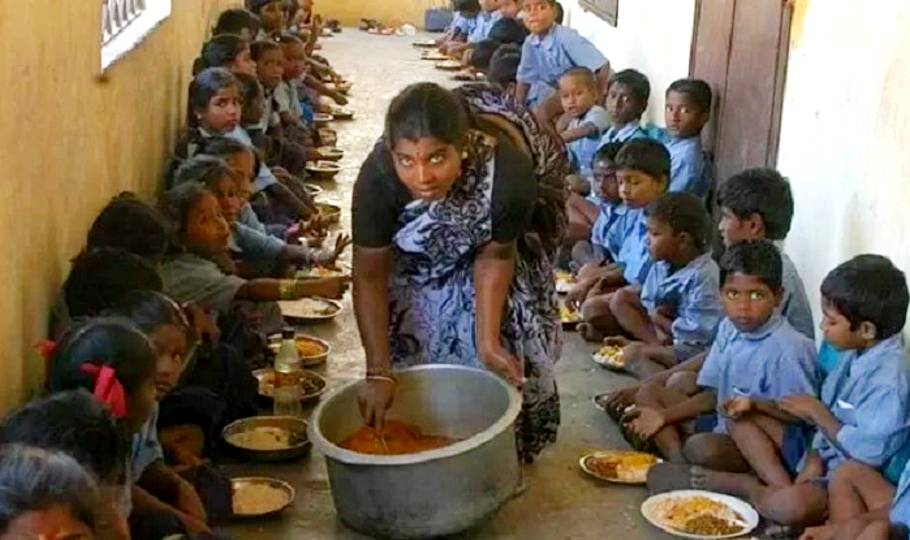
TN ropes in self-help groups for school breakfast scheme, upsets many
Assigning the task of managing the free school breakfast scheme to women SHGs is being viewed in some quarters as an attempt by the DMK government to strengthen its vote bank

The Tamil Nadu government’s decision to rope in women self-help groups (SHG) to manage the free breakfast scheme for school children has set off a row, with allegations that this is being done to consolidate the DMK’s vote bank, the SHGs.
A pilot run of the free breakfast scheme will cover certain government schools in 15 districts of the state. This will come in addition to the midday meal scheme, which has been running for decades and has a 100-year history that was part of the Dravidian social justice movement.
It was observed that many poor students came on an empty stomach to government schools as their parents from backward and poor communities left home early for work. This prompted the government to provide free breakfast to these children.
‘SHGs are vote bank’
However, the decision to task the SHGs for this role has not gone down well with many.
“It is purely for strengthening their vote bank that the DMK government has roped in women self-help groups in this scheme,” pointed out Dr K Shanmugavelayutham, convener, TN FORCES (Forum for Creche and Child Care Services), Chennai.
The women self-help groups were a pet project of the DMK government in 1997-1998 and many of them have tasted success in terms of women achieving financial independence and social development.
Also read: SC notice to Centre on plea against removal of meat products from midday meals in Lakshadweep
Shanmugavelayutham, a renowned educational activist, added that if the breakfast scheme had been implemented through the existing strong noon-meal structure, it would have been cost-effective.
“It would be difficult to monitor the self-help groups. If there is any fault in their work; correcting them would be difficult. While selecting the groups, local politics may play a role. Also, there is a fear that the quality of food and hygiene would be compromised,” he said.
‘SHGs lack experience’
In Tamil Nadu, both the mid-day meal scheme and Centre sponsored anganwadi scheme are being implemented by social welfare and the nutritious meal program department. The salaries are paid by the state. In anganwadis, children below 5 years are provided a mid-day meal with eggs three days a week.
R Noorjahan, general secretary, Tamil Nadu Nutritious Meal Employees Association, told The Federal that her association opposes the state government’s decision to involve SHGs.
“Most of our staff have more than 20 years’ experience. For them, cooking breakfast early in the morning would not be an overload. The breakfast scheme demands women to come early in the morning, about 5 am and finish the cooking by 7–7.30 am. In most rural areas, electricity and transportation would not be there in the wee hours. Even if they (SHGs) come early, it is doubtful whether they will be able to use utensils which are used for large-scale cooking because till now they have cooked only in their houses. So, it would be difficult for the self-help group members to meet these demands,” she said.
Also read: Akshaya Patra, UN to collaborate on improving school meal programme
She also said that if there is any food poisoning in the breakfast, the public will blame the nutritious meal employees only.
“There are some 30,000 vacancies in the noon meal scheme. We have an organiser, a cook and an assistant cook for every school. In most places, one organiser takes care of 4–5 schools, since the vacancies are not filled. If the government fills those vacancies, we can work for breakfast scheme too,” Noorjahan said.
SHGs selected by Panchayats
However, an official involved in the breakfast scheme said SHGs were roped in to effectively utilise the services of women.
“Since the scheme is implemented by Tamil Nadu Corporation for Development of Women through Tamil Nadu State Rural Livelihood Mission, under which ‘Mahalir Thittam’ (women self help groups) is steered, we have decided to give preference to women self-help groups. It should be noted that the women’s self-help groups are performing well in the state and to empower the rural women, we have roped them in,” said the official.
The SHGs are selected on the basis of the recommendations made by the Panchayat Level Federations (PLF) which monitors them, he said requesting anonymity.
“After receiving a recommendation list from the federations, it will be forwarded to a core committee. The committee consists of school headmaster, panchayat president, a member from school management committee, a member from PLF and a community resource person appointed by Partnership Development and Convergence of Tamil Nadu State Rural Livelihood Mission, as members,” he said.
Also read: To tackle malnutrition, govt to identify locally available nutritious food
The self-help groups are chosen based on the years of their existence and activities. Three members from a group will be selected for a school. The children of these three members should be a student of the same school. There will be no rotation of staff. They will be given training and their salaries are ₹2,000 per month. The menu includes kichadi, sakkarai pongal, rava upma, milagu pongal, etc. The existing kitchens in the schools that are used for the mid-day meal scheme will be used.
“The members should procure vegetables and other items for cooking. For this, an additional amount will be paid. The breakfast should be served to children between 8.15 am and 8.45 am,” the official added.
As many as 292 villages in the 15 districts of Dharmapuri, Karur, Thoothukudi, Tirupattur, Krishnagiri, Sivagangai, Theni, Virudhunagar, Trichy, Dindigul, Erode, Kallakurichi, Namakkal, Nilgiris and Tiruvannamalai would be selected for the pilot run of the scheme.


